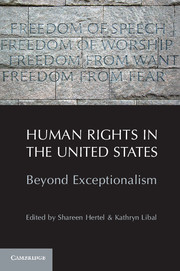Book contents
- Frontmatter
- Contents
- Contributors
- Acknowledgments
- Foreword: Are Americans Human? Reflections on the Future of Progressive Politics in the United States
- 1 Paradoxes and Possibilities: Domestic Human Rights Policy in Context
- SECTION I STRUCTURING DEBATES, INSTITUTIONALIZING RIGHTS
- SECTION II CHALLENGING PUBLIC/PRIVATE DIVIDES
- SECTION III FROM THE MARGINS TO THE CENTER: MAKING HARMS VISIBLE THROUGH HUMAN RIGHTS FRAMING
- 10 The Law and Politics of U.S. Participation in the UN Convention on the Rights of Persons with Disabilities
- 11 The Anomaly of Citizenship for Indigenous Rights
- 12 Human Rights Violations as Obstacles to Escaping Poverty: The Case of Lone-Mother-Headed Families
- 13 The Human Rights of Children in Conflict with the Law: Lessons for the U.S. Human Rights Movement
- 14 LGBT Rights as Human Rights in the United States: Opportunities Lost
- 15 No Shelter: Disaster Politics in Louisiana and the Struggle for Human Rights
- APPENDIX 1 Universal Declaration of Human Rights
- APPENDIX 2 International Covenant on Economic, Social and Cultural Rights
- APPENDIX 3 International Covenant on Civil and Political Rights
- Index
- References
10 - The Law and Politics of U.S. Participation in the UN Convention on the Rights of Persons with Disabilities
Published online by Cambridge University Press: 05 June 2012
- Frontmatter
- Contents
- Contributors
- Acknowledgments
- Foreword: Are Americans Human? Reflections on the Future of Progressive Politics in the United States
- 1 Paradoxes and Possibilities: Domestic Human Rights Policy in Context
- SECTION I STRUCTURING DEBATES, INSTITUTIONALIZING RIGHTS
- SECTION II CHALLENGING PUBLIC/PRIVATE DIVIDES
- SECTION III FROM THE MARGINS TO THE CENTER: MAKING HARMS VISIBLE THROUGH HUMAN RIGHTS FRAMING
- 10 The Law and Politics of U.S. Participation in the UN Convention on the Rights of Persons with Disabilities
- 11 The Anomaly of Citizenship for Indigenous Rights
- 12 Human Rights Violations as Obstacles to Escaping Poverty: The Case of Lone-Mother-Headed Families
- 13 The Human Rights of Children in Conflict with the Law: Lessons for the U.S. Human Rights Movement
- 14 LGBT Rights as Human Rights in the United States: Opportunities Lost
- 15 No Shelter: Disaster Politics in Louisiana and the Struggle for Human Rights
- APPENDIX 1 Universal Declaration of Human Rights
- APPENDIX 2 International Covenant on Economic, Social and Cultural Rights
- APPENDIX 3 International Covenant on Civil and Political Rights
- Index
- References
Summary
INTRODUCTION
On July 30, 2009, the United States signed the United Nations Convention on the Rights of Persons with Disabilities (CRPD), reversing the Bush Administration's general disengagement with the convention. America historically has considered itself the global leader in disability civil rights law and policy, and largely deserves this reputation. Signature by the United States signals an intention to ratify the treaty, and President Barack Obama's Administration is submitting its convention ratification package to the U.S. Senate in short order. Notably, the CRPD (2007) is the first human rights treaty to be signed by the United States since the Convention on the Rights of the Child (1989) in 1995.
The worldwide momentum in favor of CRPD ratification poses both a challenge and an opportunity for the United States as a recognized disability rights leader. Ratification would signal an American return to active participation in the UN human rights system, supporting other efforts made by the Obama Administration in that direction, such as joining the UN Human Rights Council. It also would help reinstate the global leadership of the United States in disability law and policy after its relative disengagement from the globally supported CRPD treaty negotiations by the Bush Administration. Yet the prospects for such reinstatement must be set against the political landscape of American nonparticipation in human rights treaties and the challenges of a ratification effort for an American disability community rooted in a tradition of domestic civil rights advocacy and largely disconnected from the global human rights movement.
- Type
- Chapter
- Information
- Human Rights in the United StatesBeyond Exceptionalism, pp. 199 - 216Publisher: Cambridge University PressPrint publication year: 2011
References
- 1
- Cited by

